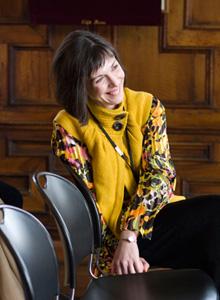Art at the Heart of the College: Teaching and Learning at the Mead
Faculty Biographies

Elizabeth E. Barker
Director
Mead Art Museum
Elizabeth E. Barker, Ph.D., became the director of Amherst College’s Mead Art Museum in 2007, after previously working as a curator at the Metropolitan Museum of Art, the British Museum, and the Yale Center for British Art, and as the director of Colgate University’s Picker Art Gallery. As a scholar, Lizzie’s publications focus on British art of the 18th and 19th centuries, with particular attention to the work of Joseph Wright of Derby, Samuel Palmer, and William Blake. As an administrator, Lizzie is leading an initiative to integrate the Mead more fully into the intellectual life of the College through fresh collaborations with faculty and students across the academic disciplines—from calculus to classics to music—involving Amherst’s encyclopedic collection of 17,000 artworks.
Randall Griffey
Head of Curatorial Affairs and Curator of American Art
Mead Art Museum
Randall R. Griffey, Ph.D., is head of curatorial affairs and curator of American art at the Mead Art Museum, where he oversees one of the strongest collections of historical American art held by an academic institution. He was previously Associate Curator of American Art at the Nelson-Atkins Museum of Art (Kansas City, Missouri). His publications and research have focused on American modernism and on the art of Marsden Hartley particularly. Among Randy’s numerous publications, two have garnered the distinguished national award from the Association of Art Museum Curators: "Outstanding Article, Catalogue Essay, or Extended Catalogue Entry” of 2008 and 2011.

Tekla Harms
Professor of Geology and Director of the Beneski Museum of Natural History
My teaching interests revolve around all forms of geodynamics, or the changes the earth undergoes that are driven by its internal heat, by mantle convection, and by plate motion-tempered by isostasy and gravity. These broad topics appear in our introductory courses (Geology 11 and 21), which I teach in almost every semester; in intermediate level courses such as Structural Geology (Geology 29); and in the upper level course Plate Tectonics and Continental Dynamics (Geology 40).
I have a number of long-term research projects located around the globe. While they may seem disparate, each in its own way seeks to understand the evolution of mountain belts and the interactions of plate boundaries in creating those belts. Detailed structural analysis - looking at the small scale evidence of major crustal displacement - is one of the tools I use to investigate mountain belts.
Ph.D., University of Arizona (1986)
M.Sc., Queen's University (1982)
A.B. Bryn Mawr College (1977)
A.M. (honorary), Amherst College (1999)
Robert T. Hayashi
Assistant Professor of English and American Studies
Victoria Maillo
Lecturer of Spanish
Samuel Morse
Howard M. and Martha P. Mitchell Professor of the History of Art and Asian Languages and Civilizations
My courses in both my departments focus on the visual arts of Japan and pre-modern China.As a specialist in Japanese Buddhist art my approach is necessarily both interdisciplinary and highly contextual. I offer semester-long surveys on the arts of Japan and the arts of China in addition to more specialized classes on the religious arts of Japan, Japanese art of the early modern and modern period, and Chinese painting. I teach seminars on religious art and its ritual context, the Japanese tea ceremony and museum studies.Frequently I offer a First-year Seminar on Japan team taught with members of the Department of Asian Languages and Civilizations.
I serve as Consulting Curator for Japanese Art at the Smith College Museum of Art where I have curated exhibitions on the arts of the Japanese tea ceremony and on contemporary Japanese art. In addition I have organized exhibitions on Kitagawa Utamaro for the Mead Art Museum (2006), on the art of Allen Say the Eric Carle Museum of Picture Book Art (2007) and on Japanese Buddhist art and ritual for the Katonah Museum of Art and Museum of Fine Arts, Boston (1996-1997). For six years I was chairman of the Board of Directors for the Clark Center for Japanese Art in Hanford, California. I have been a visiting researcher at the Tokyo National Research Institute of Culture Properties and a visiting professor Yale University.
Ph.D., Harvard University (1985)
A.B., Harvard College (1978)
A.M. (honorary), Amherst College (1995)
Pamela Russell
Head of Education and Andrew W. Mellon Curator of Academic Programs
Mead Art Museum
Pamela Russell, Ph.D., is head of education and Andrew W. Mellon curator of academic programs at the Mead. Pam received her undergraduate degree in Archaeology and Classical Civilizations from Yale College and her doctorate in Classical Archaeology from the University of Pennsylvania. Her research interests have focused on the Late Bronze Age of Cyprus. She was Curator of Classical Art at the Tampa Museum of Art and Curator of Collections at the Fitchburg Art Museum. She also has extensive experience in museum education, having served as head of museum education at the Michael C. Carlos Museum of Emory University, and as Coordinator of Interpretive Resources at the Museum of Fine Arts, Boston. Pam serves as Vice President for Outreach and Education on the Governing Board of the Archaeological Institute of America (AIA).
Kim Townsend
Class of 1959 Professor of English, Emeritus
Bettina Jungen
Thomas P. Whitney '37 Curator of Russian Art
Mead Art Museum
Before Dr. Bettina Jungen joined the Mead in 2009 as Thomas P. Whitney ’37 curator of Russian art, she taught art history at the University of Zurich (Switzerland) and worked on exhibitions of Russian art at museums in Germany and Switzerland. A specialist in Russian art of the 20th century, Bettina received her doctoral degree in 2004 with a monograph on the Soviet sculptor Vera Mukhina. Bettina’s studies bring her often to Russia. From 2001 to 2004, she lived in Moscow; in 2012, she held a prestigious Likhachev Foundation Cultural Fellowship in St. Petersburg. Jungen is interested in the synthesis of the arts and cross-disciplinary projects, in which she often factors her own ballet education.